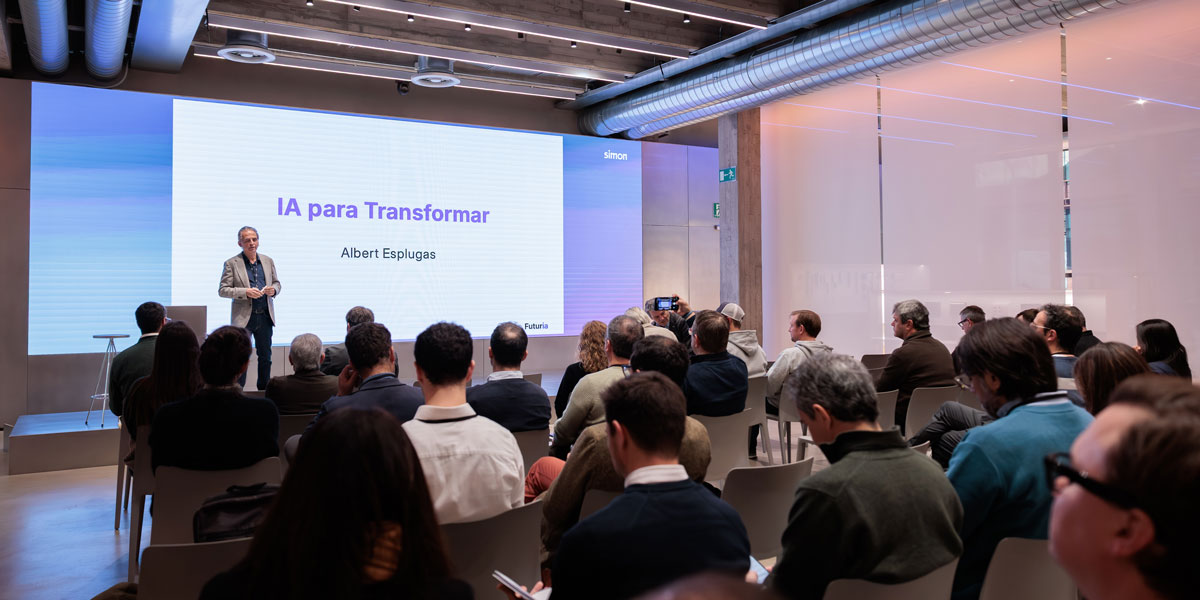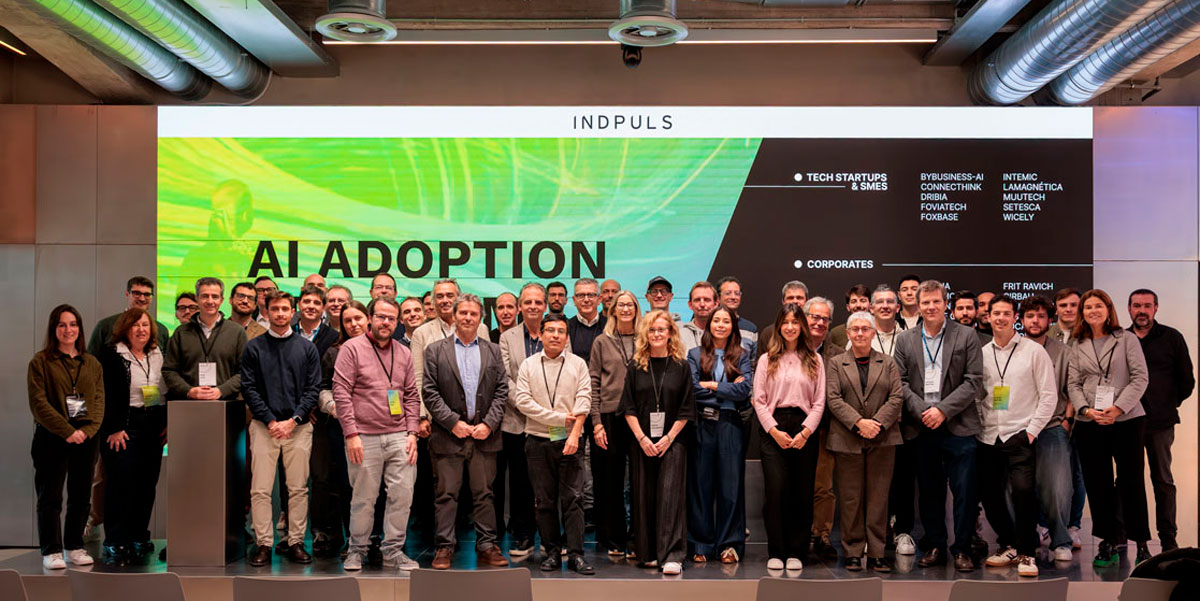Industry 4.0: the connected industry revolution

With connectivity, automation, and artificial intelligence technologies, a radical change has arisen in how the industry produces goods and offers services. This new era of the industry is known as Industry 4.0, a true revolution of the connected enterprise. Industry 4.0 is a technological revolution that transforms the way business is conducted in industry, the industry itself, and even the world.
This Indpuls blog article will explore how Industry 4.0 is transforming the industry, from manufacturing to logistics to customer service.
Together with two of our partners, Anna Casals, Director of Innovation at CELSA, and David Tapias, Director of Innovation at FLUIDRA, we will see how connectivity and automation technologies are opening up new opportunities for companies. In the same way, we will review the challenges and opportunities that Industry 4.0 presents us.
About Industry 4.0
Industry 4.0 represents a radical change and the promise of a significant improvement in efficiency and competitiveness. Talking about Industry 4.0 is talking about the use of advanced technologies to improve efficiency in production, supply chain, and decision-making, which is articulated through connectivity and data exchange between devices and communication networks. Automation and artificial intelligence also play an essential role, as they enable greater adaptability and efficiency in production.
Optimizations of several disciplines and technological progress have made it possible to reach this point; technologies such as robotics, analytics, artificial intelligence, nanotechnology, and the Internet of Things (IoT) are some of them.
If you understand the changes and opportunities that Industry 4.0 offers, you can take advantage of an excellent opportunity for growth and competitiveness. Some can adapt and stay on the front line in every revolution, and those who become obsolete fall off the boat. Precisely for this reason, companies must be aware of these technologies to invest in those that best suit their needs and thus not risk losing market share.
The Path of Information in Industry 4.0
Industry 4.0 represents a significant change for those traditional leaders who are used to handling linear information and communications. With real-time data access, we make decisions that will be completely different. The digital integration of information from various sources and locations enables an endless cycle of operations. This cycle is driven by a continuous, iterative flow of information and actions between the physical and digital worlds, known as the PDP process (from the physical world to the digital, from digital to digital, and from digital to the physical world). This allows the capture, sharing, interpretation, and application of relevant information to improve decisions and actions in the industry.
What does it mean? That the information passing from the physical to the digital world allows us to draw conclusions that will apply in the physical world. The path of information would be as follows:
– From the physical to the digital world: information is extracted from the physical world, and a digital record is created.
– From digital to digital: at this point, information is shared and interpreted with the use of advanced analytics, artificial intelligence, and data analysis so that relevant information can be discovered, such as patterns of behavior, errors, and problems to improve.
– From the digital to the physical world: through the application of algorithms, these analyzed data are translated into applications in the physical world, stimulating actual actions and changes.
Why is so crucial 4.0 Industry?
Yes, Industry 4.0 can help decision-making and improve revenue, transforming the supply chain and changing customer expectations. It would be a mistake to think that the potential of this fourth industrial revolution will only affect manufacturing processes and industry. Its scope is much broader and will extend to all layers and sectors of society. While we’re talking about how we do things will change, we also need to focus on how it will change how customers interact with businesses.
We speak of revolution because it will mean a radical change in many aspects beyond those we have already talked about. For example, how will it affect the labor market? Many jobs will be automated, but new roles and capabilities aimed at data analytics will also be needed.
The use of sensors and wearable devices, analytics, and robotics, among others, will enable product enhancements in various ways, from prototyping and testing to incorporating connectivity into previously disconnected products. In addition, technologies related to this industry can also lead to entirely new products and services. These changes in products translate, in turn, into changes in the supply chain and, consequently, in customers—a cycle of innovation.

David Tapias, FLUIDRA’s Director of Innovation, shares the essential points that every organization should keep in mind to take advantage of Industry 4.0.
How does Industry 4.0 impact companies?
The impacts of Industry 4.0 can be observed at multiple levels: in large ecosystems, at the organizational level, and the individual level (on employees and customers). We spoke with David Tapias, director of innovation at FLUIDRA, one of the founding companies of INDPULS, about what impact Industry 4.0 will have on companies and how organizations should adapt. Tapias has given us the 6 fundamental points that every organization should keep in mind to take advantage of this opportunity:
- Invest in technology: Industry 4.0 is based on advanced technologies such as IoT, artificial intelligence, automation, and robotics, so organizations must invest in these technologies to compete.
- Train staff: The implementation of advanced technologies requires trained staff. Organizations must invest in their staff training to ensure that they can work with new technologies.
- Adopt a collaborative approach: Industry 4.0 is based on collaboration and interconnection. Organizations must take a collaborative approach and work with other organizations and suppliers to make the most of the opportunities of Industry 4.0.
- Adopt a customer-centric approach: Industry 4.0 allows for greater customization and adaptation to customer needs; organizations must adopt a customer-centric approach to offer personalized products and services.
- Adopt a circular economy approach: Industry 4.0 promotes greater efficiency and lower environmental impact. Organizations must adopt a circular economy approach to reduce waste and maximize resource use.
- Be flexible and adaptable: Industry 4.0 is characterized by rapid evolution, and organizations must be flexible and adaptable to evolve and adapt to changes.

Industry 4.0 examples
Throughout the article, we have already intuited some examples of possible applications of industry 4.0. Still, one of our biggest challenges as a society is the constant search for sustainability in all our industrial processes. According to Anna Casals, director of innovation at CELSA, one of the 11 founding companies of INDPULS: “Organizations must bet on innovation to develop new technologies and cutting-edge projects to lead the decarbonization of the industry, complete the circular supply chain and digitize their systems and equipment to be more competitive and energy-efficient, clearly betting on Industry 4.0. «
In the same sense, Anna Casals emphasizes the leading role that this change must have in companies to be able to invest more time and workforce in the significant changes: “Digital transformation is key since it allows us to understand our processes better, identify and eliminate possible sources of error, increase the efficiency and productivity of operations and optimize production and logistics. This way, we can invest more time in tasks that provide added value, thus directly impacting sustainability.
«Industry 4.0 is seen as an opportunity to increase sustainability in companies by developing new technologies and cutting-edge projects, improving energy efficiency, and digitizing systems and equipment.
As you have seen in this article, Industry 4.0 will represent – or rather, it already is – a fundamental paradigm shifts in how the world works. It would be very naïve to believe this will only affect the industry. Its importance is perhaps only comparable to other great technological revolutions, such as the steam engine or the emergence of the internet. Today, with the internet, we enjoy services and products that we could never have imagined. Do you dare to imagine what we will say 30 years from now?





